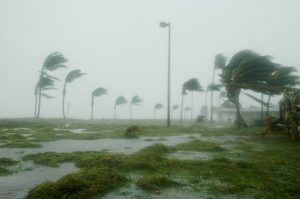Hurricane Ida brought destruction to Louisiana and the Gulf Coast, leaving millions without power for what is projected to be weeks, wreaking havoc on homes and business properties, and weakening the societal infrastructure that is needed to keep things running safely and smoothly. This has left many wondering what’s next? It is important to be prepared for what Mother Nature has in store for the coming weeks for the Atlantic and Southeastern states.
Hurricanes are named alphabetically at the start of every hurricane season in June. The names are always predetermined by the National Weather Service. The letter “I,” is the ninth letter of the alphabet and the ninth storm of the season that typically occurs at the end of September. 2021 has been an active storm season, but Hurricane Ida occurred roughly a month ahead of schedule and was one of the most powerful storms the United States has seen. It now joins the ranks of other powerful “I” storms, 2004’s Ivan and 2017’s Irma, which is one that Floridians remember well.
A look back at 2020 shows that this was also an active hurricane season, bringing 30 named storms, 14 hurricanes (7 major hurricanes), 11 named storms hitting the U.S. coastline, and then Greek letters being used for names as the busy hurricane season came to a close.
 Taking a peek back at the previous years of storms shows a disturbing trend: an increase in named storms and an intensity that is ferocious. Hurricane Ida went from a Category 1 Hurricane to a Category 4 Hurricane on the Saffir-Simpson Hurricane Wind Scale too quickly for most to develop a plan of action to protect themselves and their property from the storm that intensified from 85 mph to 150 mph in less than 24 hours. With that said, Floridians are urged to not only prepare for more storms, but more storms that are dangerous forced that could end in great destruction.
Taking a peek back at the previous years of storms shows a disturbing trend: an increase in named storms and an intensity that is ferocious. Hurricane Ida went from a Category 1 Hurricane to a Category 4 Hurricane on the Saffir-Simpson Hurricane Wind Scale too quickly for most to develop a plan of action to protect themselves and their property from the storm that intensified from 85 mph to 150 mph in less than 24 hours. With that said, Floridians are urged to not only prepare for more storms, but more storms that are dangerous forced that could end in great destruction.
Storm names remaining for the 2021 season are:
- Larry
- Mindy
- Nicholas
- Odette
- Peter
- Rose
- Sam
- Teresa
- Victor
- Wanda
What Do You Do After a Hurricane?
After surviving a powerful storm, don’t be shocked when your own insurance company denies your claim. Your insurance company may have a laundry list of reasons they provide as to why your claim will be delayed or outright denied. Continue reading

















